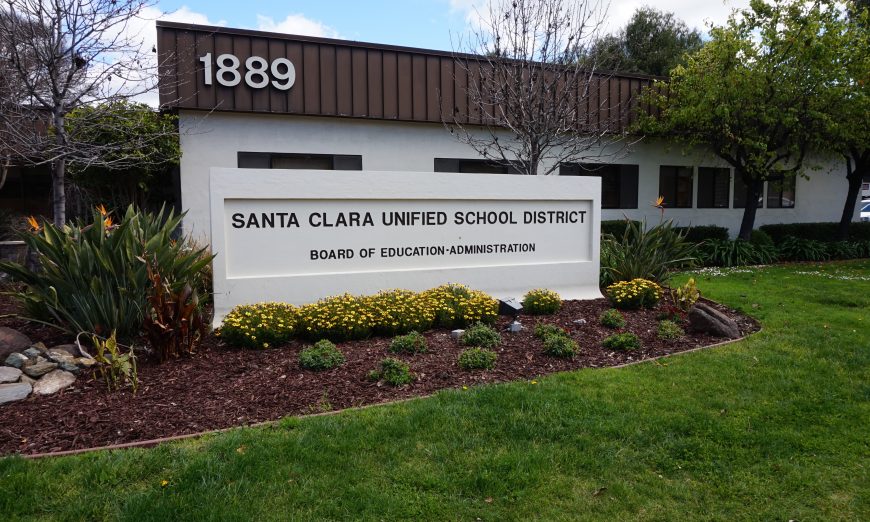The Santa Clara Unified School District Board of Trustees held a public hearing regarding their transition from a six-decade-old election system to a By-Trustee Area election system to protect them from a costly California Voting Rights Act lawsuit. Will the District follow their legal counsel’s advice to comply quickly and affordably, or will they hold a costly election and rack up legal battle costs?
Board of Trustee Elections
At the beginning of 2021, the Board decided to transition to a By-Trustee Area election system. The District was warned that their current voting system violated the California Voting Rights Act (CVRA), making the District vulnerable to lawsuits. The current from-district and multi-member trustee area system, according to the CVRA, dilutes protected minorities’ vote, blocking minorities from equal representation. The Board must switch to a By-Trustee Area system. They are currently in “safe harbor” but that will not save them from lawsuits if they don’t act in a timely matter.
The discussion focused again on seeking a waiver to bypass an election for the transition. District Counsel Jonathan Salt said they have sought feedback from the community and stakeholder groups, and none had objections to the waiver. However, Board Members Andy Ratermann and Jim Canova — who have been on the Board the longest — had qualms even though they kept repeating that they did support the CVRA.
Despite having a meeting two days ago about the budget and hearing some bleak news, Ratermann said he was interested in holding an election to get voter input. He asked staff to gather the costs of not getting the waiver and, instead, holding an election as well as the costs if they were to get sued for dragging out this process.
The City of Santa Clara had to pay about $5.8 million after their costly CVRA legal battles and that doesn’t include the two failed ballot measures they did.
Similarly, Canova also said he was interested in getting the waiver but then also having an advisory vote about the maps. Salt reminded the Board that after the Census data is available, elected officials across the country will be redistricting and that they don’t do it by an election.
“The voters have had a say in electing the Board to make this kind of decision,” said Salt.
Salt also wasn’t sure if Canova’s idea was possible or would even work within their timeline. If they don’t change their election system in time, they are at risk of being sued. Salt said he would investigate it but said he thinks an election would cost at least six figures.
“I would hope that the Board does not take that route,” said Gonzalez about the cost of an election. “I think it’s something that was mentioned in a previous meeting, to be in safe harbor, we have to do this irregardless of the vote of the public.” He said he’d rather spend money on engagement with the community.
Mark Schiel, Chief Business Official, said the estimated cost of this process without the election would be $50,000 to $75,000.
“This is one of those things that we were elected to do. This is what leadership is about,” said Board President Jodi Muirhead. “It’s our responsibility to listen to the community about what the maps should look like and decide on a map. I worry, like others, about sending the question to the voters… it’s very complicated, but it’s something very straightforward for us to take care of. If we don’t, we’ll be out a whole lot of money. First, we’re gonna be spending money on the election, and then we’re gonna be fighting a lawsuit and being told to do it anyway.”
Ratermann said if they don’t hold the election, he’s worried voters may feel tricked when the transition happens. He was concerned about “diluting voting power.” However, the CVRA, by design, made to give equal voting power to minority voters.
Vice President Vickie Fairchild voiced concerns about outreach. The one mailer the District sent out so far was only in English. Fairchild said it went against the spirit of the CVRA. Many Board Members agreed, saying they need to improve their outreach. Canova said since the District’s outreach wouldn’t be sufficient, they should hold an election.
Salt explained that the transition process includes many required public meetings, some before the election maps being drawn and then many more after. They can also add more community outreach meetings if they wanted to. He said they would do significant outreach. He also clarified that maps are fluid and can keep changing the map until right before their hearing.
This will come back to the Board’s next meeting.
Classified Data, Assessment and Accountability Manager
Chief Academic and Innovation Officer Brad Stam presented the rationale behind the District’s need for a Classified Data, Assessment and Accountability Manager. However, public commentors and the Board couldn’t help but bring up the fact that the community has been pleading for a Director for the English Learners department.
Stam said he hears the feedback and that they are looking into the idea of having a director.
The manager job will come back to the next meeting.
Other Business
The Board told staff they want to make sure they have up-to-date cost analyses done for their current projects before hearing more about redoing the tennis courts at Wilcox.
Ratermann requested a future agenda item for a resolution regarding water conservation. The Board supported it and it will come back, date to be determined.
Lise Strom was appointed Title IX/Compliance Coordinator.
The update on the virtual program option was pushed to the next meeting. The Board meets next on Thursday, May 27 at 6:30 p.m.






